A
B
C
D
E
F
G
H
I
J
K
L
M
N
O
P
Q
R
S
T
U
V
W
X
Y
Z
Full List

How did European and other visitors first build up their picture of ancient and medieval Damascus? Damascus attracted fewer long-term European residents than Aleppo, particularly due to its lower level of commercial exchanges with the West. The first short-term visitors were driven by a desire to fill out the picture in which events of the […]
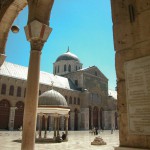
It is impossible to summarise in a few words the beauty and significance of this building. Few other structures from the ancient world speak so eloquently of the many phases of their history—its beginnings as the temple of the early Roman period dedicated to Jupiter (as successor to the Semitic deity, Hadad, god of the […]
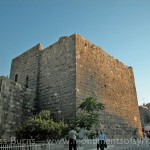
Only recently liberated from centuries of use as a fort and a prison, the Damascus Citadel is still relatively unknown from an internal perspective. Outside, the south face is obscured by the long shopping street, the Suq al-Hamidiye, but the external walls to the west, north and partly on the east offer a walking circuit […]

This itinerary concentrates on buildings either side of the Suq al-Hamidiye which joins the western edge of the ancient city to the Great Mosque of the Umayyads. I covers several buildings that cluster between the Great Mosque and the Citadel. دمشق – المسار 04، منطقة سوق الحميدية يركز هذا المسار على المباني الواقعة على جانبي […]

This itinerary takes you through the busy commercial heart of the old city of Damascus. The streets are still lined with the great khans of the trading enterprises of the Mamluk and Ottoman periods as well as with important tombs, madrases and mosques—illustrating the close association over the centuries between trade and faith under Islam. […]
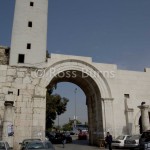
Straight Street must be one of the best-known thoroughfares in the world, famed as the ‘Street Called Straight’ of the New Testament and its account of St Paul’s eventful sojourn in Damascus. Along its 1.5 km length, so much history unfolds before your eyes that it is difficult to take it all in. This itinerary […]

This itinerary covers the areas immediately outside the southwest corner of the city walls. The street called al-Sinaniye leads from the mosque of that name towards the southwest where it touches on the Midan Quarter (see separate itinerary), skirting the historic Cemetery of Bab al-Saghir, said to contains several burials of significance in early Islam. […]

Syria has an important network of museums, of which the ones in Aleppo and Damascus are given ‘national’ status and provide a comprehensive range of material from all the main eras and regions of the countryamascus museum is spread over a large number of rooms and halls. Among the highlights are the important collections from […]

The Ottomans moved quickly to set their mark on Syria after defeating the last Mamluks outside Aleppo in 1516. One of their first priorities was to establish infrastructure for the annual Muslim pilgrimage (hajj) to Mecca each year. The Tekkiye was a major prestige project set in an area reserved to handle the tens of […]
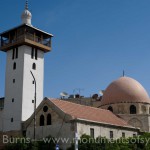
A relatively short itinerary that take you west to east across the lower slopes of Jebel Kassyun behind Damascus. This extra-mural quarter was first developed as a refuge for Palestinians fleeing an earlier crisis in Palestine—the Crusaders’ bloody taking of the city in 1099. Salihiye acquired a reputation for holiness given the number of religious […]

This route takes you through the first kilometre or more of the route the pilgrims took from Damascus as they set out on their journey to Mecca for the annual Hajj. While not marked by any spectacular buildings, Midan Street traverses many small examples of piety endowed by the city’s rulers across the centuries from […]
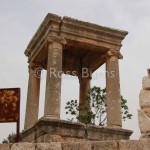
This busy town on the Plan of Dana, south of Jebel Sheikh Barakat, was still noted for several ancient structures in the accounts of late 19th and early 20th century European and American visitors. The only surviving remains is the canopied tomb, with a pyramid roof supported on four columns (probably 3rd or 4th century […]

Dana (South) — the ‘south’ is added to distinguish it from the other village of this name in the Jebel Semaan area — is a thriving modern village around which cluster many remains of an ancient past. The most prominent surviving monuments are the monastery, dubbed ‘Qasr al-Banat’) on the northwestern edge of the village […]
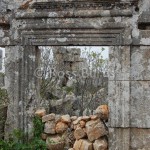
This village, situated on a relatively open area of land in the Jebel Barisha, has recently been studied intensively by French archaeologists, one of the few villages in the area made available for scientific exploration. Also unusually, the centre remained inhabited right into the Arab middle ages (perhaps due to its agricultural resources). Remains of […]

There are two sets of church remains in the vicinity of Deir al-Salib (‘Monastery of the Cross’). Just at the entrance to the village (north side) lies the church dubbed by Butler ‘West church’. Much of the structure including the semi-domed apse and the side walls survive along with a mausoleum structure on the northwest […]

In the mountainous Qalamoun area straddling the highway north from Damascus to Homs lies the small monastery of St Moses the Egyptian. Neglected for many centuries, the monastery was restored from the 1980s through the energy and dedication of the Italian Jesuit, Fr Paolo dell’Oglio. The monastery was originally founded in the sixth century but […]
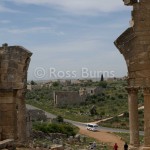
The monastic settlement at Telanissos at the foot of the ridge where the Church of St Simeon was later built, was the original monastic centre which St Simeon the Style left to take up his isolated position away from the distractions of the community. The centre flourished from the late fifth century with the fame […]

The modern town of Dera`a (Deraa), lies on the Syrian side of the Jordanian/Syrian border, with a Bronze Age citadel hill lying above the ravine of the Wadi Zedi, a tributary of the River Yarmuk. The classical city of Adraha lay to the south of the grid-plan Ottoman town and is marked by a number […]

This remarkably intact Roman religious shrine of unusual design was dedicated to Zeus Hypsistos in AD 245. يعتبر من أكمل معابد العصر الروماني، ويتميز بمخططه الغريب، وقد اكتمل بناؤه عام 245 وخصص للإله زيوس هيبيستوس (العالي).
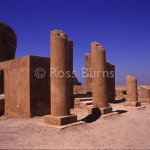
Dura-Europos is a fortress city originally established by the Greeks to protect the river route along the Euphrates. It was probably not established within its extended walls until the second century BC but fell under Parthian control early in the next century. The city was taken by the Romans under Trajan in AD 115. Though […]



















